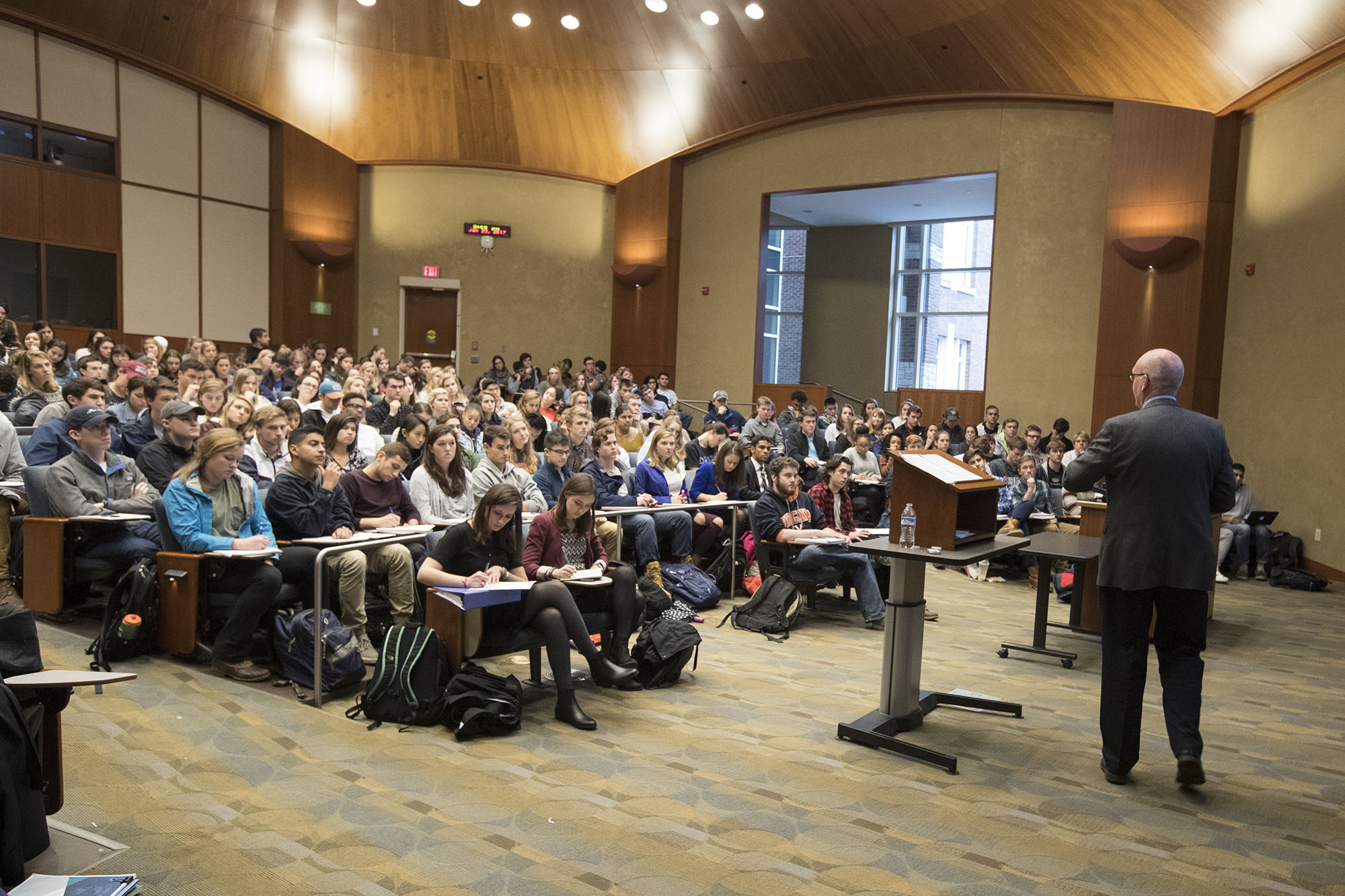University of Virginia students on Monday got a special glimpse into the global analysis work conducted by American intelligence agencies. Following the recent release of the National Intelligence Council’s quadrennial Global Trends Report, senior council officials came to Charlottesville to share their insights with undergraduates.
The report, which is meant to coincide with each new presidential term, forecasts the most pressing issues that will face the United States and the world in the coming decades. The 2017 report is titled, “Global Trends: Paradox of Progress.”
Although the declassified report is always made public, UVA’s Frank Batten School of Leadership and Public Policy is one of only a few public policy schools where students receive an in-person briefing. This is the second time that council officials have come to Grounds; they also visited to discuss their 2013 report.

Jay Okey, deputy director of the National Intelligence Council’s Strategic Futures Group, and Daniel Flynn, director of the global security program for the Strategic Futures Group, explained the report’s findings to students.
They addressed undergraduates in the “Public Policy Challenges of the 21st Century” course taught by Gerald Warburg, a professor of practice of public policy in the Batten School.
“This is the ideal method for framing the semester,” Warburg said. “While it’s intimidating for students to walk into their second day of the class and find senior intelligence officials in an undergraduate class, it really concentrates things.”
Okey and Flynn spoke to students about a range of international changes, including the increasingly global economy, evolving players on the geopolitical stage, the impact of rapid technological advances and future threats of terrorism.
“This whole Global Trends Report is about the future, and the future belongs to all of us,” Flynn said. “We’re trying to have as broad a conversation about the future with as many people as we can.”
“We did this in the preparatory phase of this report [also]. We went all around the world to 35 different countries and now we’re getting the findings out. What we talk about are a lot of challenges, but the solutions have got to come from everybody. So [to] young people coming up – you guys are the ones who are going to solve all of these things.”
In the short term, many of these issues have a daunting outlook, but the report suggested ways that policymakers might rise above the coming challenges. Specifically, it suggests that countries and communities that are the most adaptable to change will thrive.
For Warburg, one of the largest challenges facing the future leaders in his course will be the rapid rate of technological advances.
“One of the central themes of the class is that technology is accelerating the pace of change for public policymakers,” he said. “It’s coming more rapidly year-by-year, and therefore there’s a premium on preparing young policymakers to expect that. The spread of new technology is enormously disruptive to existing policy.”
As part of the course, students are required to hone their skills by choosing a pressing international policy issue and writing a two-page briefing memo analyzing it. They must also select an important domestic policy issue and write a memo evaluating future prospects for it. Students are encouraged to send both memos to their representatives in Congress.
For the first time this year, the pool of students writing these memos will also include undergraduates at UVA’s College at Wise. Using livestream video and other interactive technology, Warburg’s popular class was able to enroll students from the Southwest Virginia campus this spring.
While this is the first live video feed version of the class, past recordings of “Public Policy Challenges of the 21st Century” have been used to create a massive open online course, or MOOC. Thousands of students around the globe have taken it in that form.
The roster of past speakers recorded for the MOOC includes familiar names like U.S. Sen. Tim Kaine and former House Majority Leader Eric Cantor. This semester, in addition to Okey and Flynn, students will also hear from sitting members of Congress, leading policy academics and outside lobbying groups.
“This whole class is about making public policy more accessible,” Warburg said. “We want to make the analysis that our best experts are providing available to scholars and future policymakers. I want my students to develop the analytical skills to deal with the future and anticipate things, rather than just writing about the past.”
Media Contact
Article Information
January 23, 2017
/content/undergraduate-course-includes-briefing-senior-intelligence-officials

